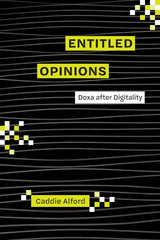1061 scholarly books by Catholic University of America Press and 45
have author last names that start with H
1061 scholarly books by Catholic University of America Press and 45
1061 scholarly books by Catholic University of America Press
45 have author last names that start with H have author last names that start with H
45 have author last names that start with H have author last names that start with H
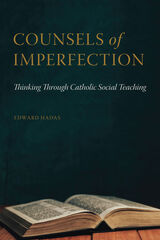
Counsels of Imperfection
Thinking Through Catholic Social Teaching
Edward Hadas
Catholic University of America Press, 2021
For more than a century, the teaching authority of the Catholic Church has attempted to walk along with the modern world, criticizing what is bad and praising what is good. Counsels of Imperfection described the current state of that fairly bumpy journey.
The book is divided into 11 chapters. First comes an introduction to ever-changing modernity and the unchanging Christian understanding of human nature and society. Then come two chapters on economics, including a careful delineation of the Catholic response, past and present, to socialism and capitalism. The next topic is government, with one chapter on Church and State, another on War, and a third that runs quickly through democracy, human rights, the welfare state, crimes and punishments (including the death penalty), anti-Semitism, and migration.
Counsels of Imperfection then dedicates two chapters on ecology, including an enthusiastic analysis of Francis’s “technocratic paradigm”. The last topic is the family teaching, which presents the social aspects of the Church’s sexual teaching. A brief concluding chapter looks at the teaching’s changing response to the modern world, and at the ambiguous Catholic appreciation of the modern idea of progress.
For each topic, Counsels of Imperfection provides biblical, historical and a broad philosophical background. Thomas Aquinas appears often, but so does G. W. F Hegel. The goal is not only to explain what the Church really says, but also how it got to its current position and who it is arguing with. In the spirit of a doctrine that is always in development, Counsels of Imperfection points out both strong-points and imperfections in the teaching.
The book should be of interest to specialists in Catholic Social Teaching, but its main audience is curious newcomers, especially people who do not want to be told that there are simple Catholic answers to the complicated problems of the modern world.
[more]
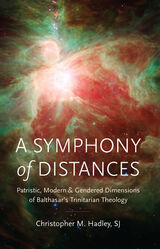
A Symphony of Distances
Patristic, Modern, and Gendered Dimensions of Balthasar's Trinitarian Theology
Christopher M. Hadley, SJ
Catholic University of America Press, 2022
The two-fold task of A Symphony of Distances is to provide an overview of Hans Urs von Balthasar’s use of distance imagery with regard to personal distinctions in the Holy Trinity and to offer a critical analysis of him as a modern Catholic theologian.
A metaphor of “distance” integrates all of Balthasar’s theological thought as a primary cipher for the many symbols through which he reads the Christian theological tradition in a trinitarian and eschatological mode. The book follows a chronological, four-stage development of Balthasar’s trinitarianism through the lens of this distance metaphor as it occurs across representative texts. The critical analysis employs the conceit of a symphony of four musical movements that correspond to four varieties of theological distance. These distances show certain correspondences of God’s creation and redemption of the world—marked by the first two “distances”—with the relations of the divine persons to each other in the economy of salvation and in the eternal Trinity itself—marked by the third and fourth distances. “Listening” to the four movements of Balthasar’s theological distances enables his readers to “hear” the themes of all four movements in the ascending order of richness, complexity, and inclusivity over the long development of his thought.
This fundamentally positive approach of A Symphony of Distances allows for a thorough critique of the internal consistency of Balthasar’s applied method, of the controversial use of gendered trinitarian notions in his speculations on divine pathos, and of his adequacy to the tasks of modern theology. The final judgment is that Balthasar’s theology of distance can be accepted, with reservations, as a positive element of his contribution to contemporary trinitarian theology. The book can thus serve as a critical reference for readers who find Balthasar’s notion of trinitarian distance, and indeed his trinitarianism as a whole, to be compelling, confusing, or frustrating.
[more]
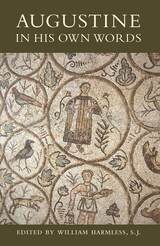
Augustine in His Own Words
William Harmless
Catholic University of America Press, 2010
This volume offers a comprehensive portrait--or rather, self-portrait, since its words are mostly Augustine's own--drawn from the breadth of his writings and from the long course of his career
[more]

Nicholas of Cusa's On Learned Ignorance
A Commentary on De docta ignorantia
Karsten Harries
Catholic University of America Press, 2024
This is the first commentary to have been written on Nicholas of Cusa's most famous work, On Learned Ignorance. This fact testifies to the difficulty of what has long been recognized to be the most significant philosophical text produced by the Renaissance. While there are many passages in the work that can be cited in support of Cassirer's celebration of Cusanus as the first modern philosopher, that judgment is challenged by the way his work is rooted in a faith and a tradition likely to strike us as thoroughly medieval. This commentary shows how closely the two are linked. Despite the many ways in which what the cardinal has to say belongs to a past that the progress of reason would seem to have left irrecoverably behind, it yet provides us with a continuing challenge. Key to On Learned Ignorance is the incommensurability of the infinite and the finite, of God and creation. Cusanus lets us recognize the essential transcendence of reality, so different from the ontology implied by Descartes' insistence on clear and distinct understanding, which has presided over the progress of science and has helped shape our world. What makes Cusanus’ thought important is not the way it anticipates modernity, but the way it challenges often taken-for-granted presuppositions of our worldview, most importantly a distinctly modern self-assertion or self-elevation that has made our human reason the measure of reality. If it is impossible to deny the countless ways in which our science and technology have given us ever deeper insights into the mysteries of nature and improved our lives, it is equally impossible to deny that this very progress today endangers this fragile earth and the quality of our lives. Cusanus can help us preserve our humanity.
[more]
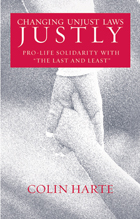
Changing Unjust Laws Justly
Pro-Life Solidarity with "The Last and Least"
Colin Harte
Catholic University of America Press, 2005
Changing Unjust Laws Justly is the first book to address systematically the practical, legal, and ethical problems that are encountered in well-intentioned attempts to restrict abortion. It will be of considerable interest not only to political, legal, and moral philosophers, but also to lawmakers and the pro-life movement generally.
[more]
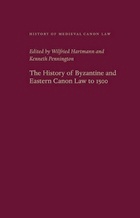
The History of Byzantine and Eastern Canon Law to 1500
Wilfried Hartmann
Catholic University of America Press, 2012
This newest volume in the History of Medieval Canon Law series surveys the history of Byzantine and Eastern canon law. Beginning in the Patristic Age, Susan Wessel outlines the evolution of ecclesiastical law before the Council of Nicaea (325 A.D.).
[more]
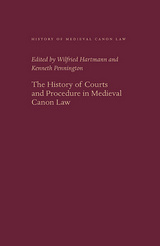
The History of Courts and Procedure in Medieval Canon Law
Wilfried Hartmann
Catholic University of America Press, 2016
By the end of the thirteenth century, court procedure in continental Europe in secular and ecclesiastical courts shared many characteristics. As the academic jurists of the Ius commune began to excavate the norms of procedure from Justinian's great codification of law and then to expound them in the classroom and in their writings, they shaped the structure of ecclesiastical courts and secular courts as well. These essays also illuminate striking differences in the sources that we find in different parts of Europe. In northern Europe the archives are rich but do not always provide the details we need to understand a particular case. In Italy and Southern France the documentation is more detailed than in other parts of Europe but here too the historical records do not answer every question we might pose to them. In Spain, detailed documentation is strangely lacking, if not altogether absent. Iberian conciliar canons and tracts on procedure tell us much about practice in Spanish courts. As these essays demonstrate, scholars who want to peer into the medieval courtroom, must also read letters, papal decretals, chronicles, conciliar canons, and consilia to provide a nuanced and complete picture of what happened in medieval trials. This volume will give sophisticated guidance to all readers with an interest in European law and courts.
[more]
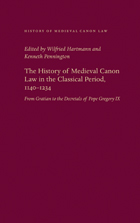
The History of Medieval Canon Law in the Classical Period, 1140-1234
From Gratian to the Decretals of Pope Gregory IX (History of Medieval Canon Law)
Wilfried Hartmann
Catholic University of America Press, 2008
This latest volume in the ongoing History of Medieval Canon Law series covers the period from Gratian's initial teaching of canon law during the 1120s to just before the promulgation of the Decretals of Pope Gregory IX in 1234.
[more]
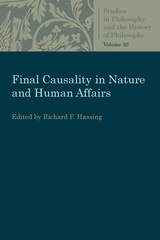
Final Causality in Nature and Human Affairs
Richard F. Hassing
Catholic University of America Press, 2018
This study of the questions of final causality is arranged in historical order from Aristotle to contemporary anthropic-principle cosmology. It discusses such teleological issues as chance and providence, and Aristotle's definition of nature in relation t
[more]
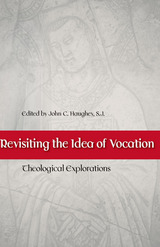
Revisiting the Idea of Vocation
Theological Explorations
John C. Haughey, S.J.
Catholic University of America Press, 2004
Until recently theologians have been in a deep slumber about the subject of vocations. This volume represents one of the first awakenings in the theological community to this subject. The ten contributors, all theologians at Loyola University Chicago, present original essays that explore vocations, or callings.
[more]
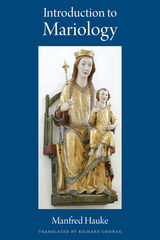
Introducation to Mariology
Manfred Hauke
Catholic University of America Press, 2020
In Introduction to Mariology, Fr. Manfred Hauke provides a synthesis of Mariology and the biblical fundaments and development of Marian doctrine. While it works as a comprehensive introduction suitable for courses on the subject, it is in reality a panoramic view on the entire Marian doctrine, and as such will be essential for the theological formation of seminarians, priests, theologians, and all kinds of educated Catholics. With an unparalleled bibliographic citation of Marian literature across a dozen languages, it is also a perfect gateway to further research on the subject.
It begins with Biblical doctrine, which is important especially for the dialogue with Protestant denominations: Catholic Mariology can be traced in its “embryonic” state already in Holy Scripture. From there Hauke presents a historical overview of the whole development of Marian doctrine, before developing further historical details in the subsequent chapters dedicated to systematic issues. The first systematic step approaches the figure of Mary through her role in the mystery of the Covenant between God and redeemed humanity; her being “Mother of God” and companion of the Redeemer is the “fundamental principle.” Then the four established Marian dogmas are presented: divine maternity, virginity, Immaculate Conception (in a chapter on Mary’s holiness more broadly), and bodily Assumption. A close look is given to maternal mediation which includes a part dedicated to the “Mater Unitatis”. A stand alone chapter is dedicated to Marian apparitions; authentic apparitions are presented as a part of prophetic charisma. The last chapter presents the basics on Marian devotion which culminates in the consecration to Mary (as a response to her maternal mediation).
Already available in Spanish, Italian, Portugese, and Korean, this landmark work is published here for the first time in English.
[more]
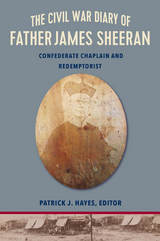
The Civil War Diary of Rev. James Sheeran, C.Ss.R.
Patrick J. Hayes
Catholic University of America Press, 2017
This exciting Civil War diary of a Redemptorist priest, Rev. James Sheeran, C.Ss.R., who was chaplain to the 14th Louisiana Regiment of the Confederacy, is a national treasure. Irish-born Sheeran (1817-1881) was one of only a few dozen Catholic chaplains commissioned for the Confederacy and one of only two who kept a journal. Highlighting his exploits from August 1,1862 through April 24, 1865, the journal tells of all the major events of his life in abundant detail: on the battle field, in the hospitals, and among Catholics and Protestants whom he encountered in local towns, on the trains, and in the course of his ministrations. His ideological sympathies clearly rest with the Confederacy. The tone is forthright, even haughty, but captures in sure and steady fashion, both the personality of the man and the events to which he was a witness, especially the major battles. The journal is arguably the most unique narrative of the war written by a chaplain of any denomination and certainly is the most extensive.
[more]
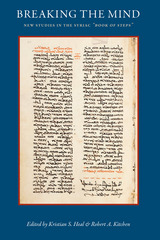
Breaking the Mind
Kristian S. Heal
Catholic University of America Press, 2014
This collection of sixteen new critical essays offers fresh perspectives on the Book of Steps, adding greater detail and depth to our understanding of the work's intriguing picture of early Syriac asceticism as practiced within the life of a local church and community.
[more]
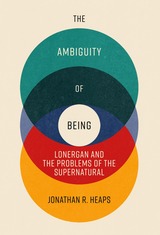
The Ambuiguity of Being
Lonergan and the Problems of the Supernatural
Jonathan R. Heaps
Catholic University of America Press, 2024
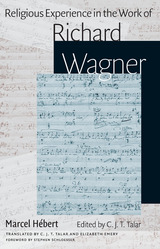
Religious Experience in the Work of Richard Wagner
Marcel Hebert
Catholic University of America Press, 2015
Philosopher Marcel Hébert developed his Religious Experience in the Work of Richard Wagner (1895) from this background of sustained popular interest in Wagner, an interest that had intensified with the return of his operas to the Paris stage. Newspaper debates about the impact of Wagner's ideas on French society often stressed the links between Wagner and religion. These debates inspired works like Hébert's, intended to explain the complex myth and allegory in Wagner's work and to elucidate it for a new generation of French spectators.
[more]

Salvation through Temptation
Maximus the Confessor and Thomas Aquinas on Christ's Victory over the Devil
Benjamin E. Heidgerken
Catholic University of America Press, 2021
Salvation through Temptation describes the development of predominant Greek and Latin Christian conceptions of temptation and of the work of Christ to heal and restore humankind in the context of that temptation, focusing on Maximus the Confessor and Thomas Aquinas as well-developed examples of Greek and Latin thought on these matters.
Maximus and Thomas represent two trajectories concerning the woundedness of human emotionality in the wake of the primordial human sin. Heidgerken argues that Maximus stands in essential continuity with earlier Greek ascetic theology, which conceives of the weakness of fallen humankind in demonological categories, so that the Pauline law of sin is bound to external demonic agents that act upon the human mind through thoughts, desires, and sensory impressions. For Thomas, on the other hand, this wound consists primarily of an internal disordering of the faculties that results from the withdrawal of original grace: concupiscence or the fomes peccati. Yet even in this framework, the devil plays a significant role in Thomas’s account of postlapsarian temptation.
On the basis of these differing frameworks for human temptation, Heidgerken demonstrates the centrality of Christ’s exemplarity in the Greek account and the centrality of Christ’s moral perfections in the Latin account. As a consequence of these emphases, the Greek tradition of Maximus places distinct limits on the ability of human emotionality (even that of Christ) to be perfected in this life, whereas Thomas’s approach allows Christ to completely embody a perfected form of human emotionality in his earthly life. Reciprocally, Thomas’s account of Christ’s moral perfections and virtue places distinct limits on his affirmation of Christ’s experience of postlapsarian temptation, whereas Maximus’s account allows for Christ to experience interior forms of temptation that more closely mirror the concrete moral experiences and circumstances of fallen human beings. Salvation through Temptation recommends a retrieval of early ascetic theology and demonology as the best contemporary systematic and ecumenically-viable approach to Christ’s temptation and victory over the devil.
[more]
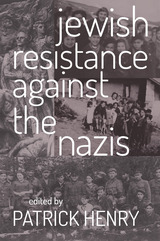
Jewish Resistance Against the Nazis
Patrick Henry
Catholic University of America Press, 2014
This volume puts to rest the myth that the Jews went passively to the slaughter like sheep. Indeed Jews resisted in every Nazi-occupied country - in the forests, the ghettos, and the concentration camps.The essays presented here consider Jewish resistance to be resistance by Jewish persons in specifically Jewish groups, or by Jewish persons working within non-Jewish organizations. Resistance could be armed revolt; flight; the rescue of targeted individuals by concealment in non-Jewish homes, farms, and institutions; or by the smuggling of Jews into countries where Jews were not objects of Nazi persecution. Other forms of resistance include every act that Jewish people carried out to fight against the dehumanizing agenda of the Nazis - acts such as smuggling food, clothing, and medicine into the ghettos, putting on plays, reading poetry, organizing orchestras and art exhibits, forming schools, leaving diaries, and praying. These attempts to remain physically, intellectually, culturally, morally, and theologically alive constituted resistance to Nazi oppression, which was designed to demolish individuals, destroy their soul, and obliterate their desire to live.
[more]
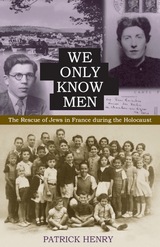
We Only Know Men
The Rescue of Jews in France during the Holocaust
Patrick Henry
Catholic University of America Press, 2007
Patrick Henry, working with more than one thousand unpublished autobiographical pages written by key rescuers and with documents, letters, and interviews never before available, reconsiders the Holocaust rescue of Jews on the plateau of Vivarais-Lignon between the years 1939 and 1944
[more]
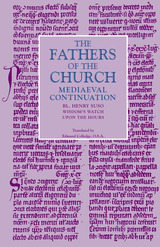
Wisdom's Watch Upon the Hours
Suso Henry
Catholic University of America Press, 1994
Written by Dominican preacher and mystic Bl. Henry Suso (c. 1300-1366), Horologium Sapientiae, or Wisdom's Watch upon the Hours, was one of the most successful religious writings of its time. Now it is offered to the English-speaking world in a new translation based on Pius Knzle's critical Latin edition.
[more]
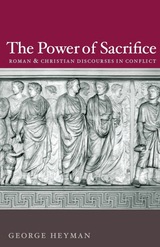
The Power of Sacrifice
Roman and Christian Discourses in Conflict
George Heyman
Catholic University of America Press, 2007
In this work, George Heyman offers a fresh perspective on the similarities between pagan Roman and Christian thinking about the public role of sacrifice in the first two and a half centuries of the Christian era.
[more]
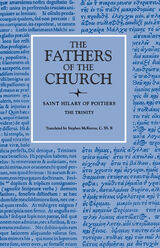
The Trinity
Saint Hilary of Poitiers
Catholic University of America Press, 1954
No description available
[more]
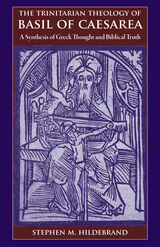
The Trinitarian Theology of Basil of Caesarea
A Synthesis of Greek Thought and Biblical Truth
Stephen M. Hildebrand
Catholic University of America Press, 2007
This book explores Basil's Trinitarian thought as the meeting place of the worlds within which he lived, that of ancient Greek culture and learning, and that of Christian faith lived in the liturgy and expressed in the Scripture.
[more]
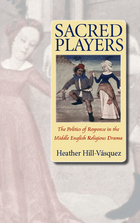
Sacred Players
The Politics of Response in the Middle English Religious Drama
Heather Hill-Vásquez
Catholic University of America Press, 2007
Offering a unique historical perspective to the study of medieval English drama, Heather Hill-Vásquez in Sacred Players argues that different treatments of audience and performance in the early drama indicate that the performance life of the drama may have continued well beyond its traditional placement in medieval history and into the Reformation and Renaissance eras.
[more]
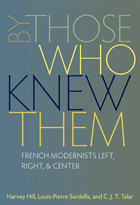
By Those Who Knew Them
French Modernists Left, Right, and Center
Harvey Hill
Catholic University of America Press, 2008
By Those Who Knew Them illuminates the lives of several key figures involved in the modernist movement--the movement for intellectual and structural renewal in turn-of-the-century Catholicism
[more]
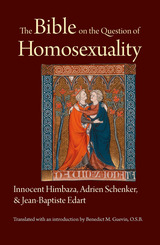
The Bible on the Question of Homosexuality
Innocent Himbaza
Catholic University of America Press, 2012
The Bible on the Question of Homosexuality addresses the hotly debated topic of whether the Bible condemns homosexuality by a close reading of the biblical texts without taboo or prejudice, without personal or church interpretation
[more]

On the Dignity of Society
Catholic Social Teaching and Natural Law
F. Russell Hittinger
Catholic University of America Press, 2024
In this collection of essays, Francis Russell Hittinger shows that Catholic social teaching is not only an articulate defense of the dignity of the human person, but perhaps more fundamentally an elucidation of the dignity of society. Indeed, Hittinger enables us to see that one cannot properly defend the dignity of the person without also showing the dignity of societies in which human persons – as naturally familial, political, and ecclesial animals – seek their own perfection in communion with others. Hittinger has been a renowned scholar of Catholic social doctrine for some time now, and the essays presented here are the fruit of his mature thinking on the topic over the course of many years. As each chapter shows, Hittinger’s historically important body of work on Catholic moral and social philosophy and theology is rooted in natural law theory and Thomistic philosophy, but also animated by St. Augustine’s thought and thus consistently sensitive to historical contexts and arenas for moral and theological disputation. These magisterial essays therefore integrate historical studies of the development of Catholic social teaching with systematic exposition of the theological coherence of that tradition, while also articulating the essential role of philosophy and natural law within both.
The volume is divided into three parts. The first part is comprised of six essays on Catholic social teaching, the second part is made up of six essays on natural law and its role in social doctrine, and the third part includes two essays discussing the first principles of the Church’s teaching on social issues. This collection will no doubt become a standard in the field of scholarship on Catholic social teaching.
[more]
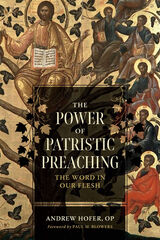
The Power of Patristic Preaching
The Word in Our Flesh
Andrew Hofer, OP
Catholic University of America Press, 2023
The Word made flesh is manifested in the lives of those dedicated to his proclamation. The Power of Patristic Preaching: The Word in Our Flesh presents seven early preachers who show, by life and speech, the divine Word’s power at work in weak human life.
The book is inspired by this question preached by Origen, “For what does it profit if I should say that Jesus has come in that flesh alone which he received from Mary and I should not show also that he has come in this flesh of mine?” In seven chapters, The Power of Patristic Preaching studies the exemplars of Origen for holiness, Ephrem for the humility of repentance, Gregory of Nazianzus for purification and faith, John Chrysostom for the hope of salvation, Augustine for love, Leo the Great for love of the poor and the weak, and Gregory the Great for accepting our own weakness.
With an emphasis on the incarnation, deification through the virtues, and proclamation, The Power of Patristic Preaching serves as a resource for those dedicated to the ministry of the Word (clerical, religious, and lay), and as a text for students of early Christian theology and practices. A Catholic work for a broad ecumenical audience, the book gives a cry from the heart in a suffering Church traveling through a world that is passing away.
[more]
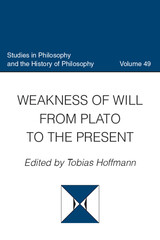
Weakness of Will from Plato to the Present (Studies in Philosophy and the History of Philosophy, Volume 49)
Tobias Hoffmann
Catholic University of America Press, 2008
In thirteen original essays, eminent scholars of the history of philosophy and of contemporary philosophy examine weakness of will, or incontinence--the phenomenon of acting contrary to one's better judgment.
[more]
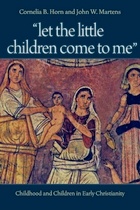
"Let the Little Children Come to Me"
Childhood and Children in Early Christianity"
Cornelia B. Horn
Catholic University of America Press, 2009
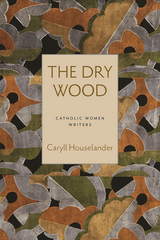
The Dry Wood
Caryll Houselander
Catholic University of America Press, 2021
In the English-speaking world, the Catholic Literary Revival is typically associated with the work of G. K. Chesterton/Hilaire Belloc, Evelyn Waugh and Graham Greene. But in fact the Revival’s most numerous members were women. While some of these women remain well known⎯Muriel Spark, Antonia White, Flannery O’Connor, Dorothy Day - many have been almost entirely forgotten. They include: Enid Dinnis, Anna Hanson Dorsey, Alice Thomas Ellis, Eleanor Farjeon, Rumer Godden, Caroline Gordon, Clotilde Graves, Caryll Houselander, Sheila Kaye-Smith, Jane Lane, Marie Belloc Lowndes, Alice Meynell, Kathleen Raine, Pearl Mary Teresa Richards, Edith Sitwell, Gladys Bronwyn Stern, Josephine Ward, and Maisie Ward.
There are various reasons why each of these writers fell out of print: changes in the commercial publishing world after World War II, changes within the Church itself and in the English-speaking universities that redefined the literary canon in the last decades of the 20th century. Yet it remains puzzling that a body of writing so creative, so attuned to its historical moment, and so unique in its perspective on the human condition, should have fallen into obscurity for so long.
The Catholic Women Writers series brings together the English-language prose works of Catholic women from the 19th and 20th centuries; work that is of interest to a broad range of readers. Each volume is printed with an accessible but scholarly introduction by theologians and literary specialists.
The first volume in the series is Caryll Houselander’s The Dry Wood. Houselander is known primarily for her spiritual writings but she also wrote one novel, set in a post-war London Docklands parish. There a motley group of lost souls are mourning the death of their saintly priest and hoping for the miraculous healing of a vulnerable child whose gentleness in the face of suffering brings conversion to them all in surprising and unexpected ways. The Dry Wood offers a vital contribution to the modern literary canon and a profound meditation on the purpose of human suffering.
[more]
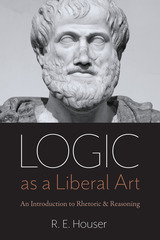
Logic as a Liberal Art
An Introduction to Rhetoric and Reasoning
R. E. Houser
Catholic University of America Press, 2020
In the twenty-first century there are two ways to study logic. The more recent approach is symbolic logic. The history of teaching logic since World War II, however, casts doubt on the idea that symbolic logic is best for a first logic course. Logic as a Liberal Art is designed as part of a minority approach, teaching logic in the "verbal" way, in the student's "natural" language, the approach invented by Aristotle. On utilitarian grounds alone, this "verbal" approach is superior for a first course in logic, for the whole range of students.
For millennia, this "verbal" approach to logic was taught in conjunction with grammar and rhetoric, christened the trivium. The decline in teaching grammar and rhetoric in American secondary schools has led Dr. Rollen Edward Houser to develop this book. The first part treats grammar, rhetoric, and the essential nature of logic. Those teachers who look down upon rhetoric are free, of course, to skip those lessons. The treatment of logic itself follows Aristotle's division of the three acts of the mind (Prior Analytics 1.1). Formal logic is then taken up in Aristotle's order, with Parts on the logic of Terms, Propositions, and Arguments.
The emphasis in Logic as a Liberal Art is on learning logic through doing problems. Consequently, there are more problems in each lesson than would be found, for example, in many textbooks. In addition, a special effort has been made to have easy, medium, and difficult problems in each Problem Set. In this way the problem sets are designed to offer a challenge to all students, from those most in need of a logic course to the very best students.
[more]

Hockey Priest
Father David Bauer and the Spirit of the Canadian Game
Matt Hoven
Catholic University of America Press, 2024
Born in Waterloo, Ontario, in 1924, to a prominent family, David Bauer attended St. Michael’s College-School run by the Basilian Fathers of Toronto. After serving in World War II, Bauer joined the religious community and coached its St. Michael’s Majors to a national championship in 1961. Influenced by philosophers like Jacques Maritain, Bauer tried to find solutions to problems created within elite hockey and thus founded Canada’s first ever National Team program. This team countered the cutthroat ideals of hockey’s powerbrokers and set out to return Canada to international glory. The team represented the nation at several global tournaments and three Winter Olympic Games. Bauer was posthumously inducted into the Hockey Hall of Fame in 1989.
Hockey Priest looks past simply understanding Bauer as a do-gooder or hockey innovator. It shows how he attempted to create a different stream of hockey that could better support youth and so build up the nation. Archival research for the book uncovered Bauer-written hockey reports, speeches, and notes that detail his thinking about the game and his politicking to bring about change in it. Interviews with dozens of associates and family members told the story of his bold efforts to take on the National Hockey League. Despite his work being undermined by some supporters of the corporate game, Bauer offered a vision for Canada’s sport that remains an important counterpoint in the sport’s history and its ongoing challenges.
[more]
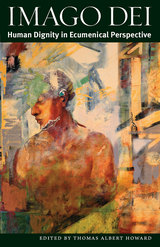
Imago Dei
Thomas Albert Howard
Catholic University of America Press, 2013
Imago Dei will serve as an indispensable resource for those wishing to deepen their grasp of the theological bases for Christian views of human dignity, as well as for those who believe that Christ's words "that they be one" (John 17:21) remain a theological imperative today
[more]

John Chrysostom, Theologian of the Eucharist
Kenneth J. Howell
Catholic University of America Press, 2024
Despite the fact that John Chrysostom wrote more on the Eucharist than any other Greek Church Father, there has never been a full treatment of his doctrine in English. In this book, Kenneth Howell brings together a wide array of sources from which he develops a many-sided portrait of Chrysostom’s eucharistic thought. While the Antiochene preacher assumed the real presence and the sacrificial nature of the Eucharist, he focused more on the moral and spiritual implications of communion. At the root of his theology lies the conviction that the Eucharist with its home in the liturgy is the extension of Christ’s incarnate life through space and time. All
that Christ accomplished in his life, death, and resurrection is present and available to the communing Christian who stands in union with the angelic hosts in the liturgy of the church. John’s preaching at times reaches encomiastic proportions as he never tires of praising the benefits and power of the Eucharist and he deftly applies the sacrament to the struggle of virtue and vice as he explores both the invitation and the obstacles to communion. Among the moral implications of the Eucharist, John seems to distinguish well between sins arising from human weakness versus malicious dispositions freely chosen. He is especially keen to exhort his hearers to lay aside
the remembrance of evil (mnesikakia) done to them in their past lives. Humility and forbearance are two essential virtues in arriving at forgiveness of past injuries. And lack of forgiveness is like greed in that both constitute a turn in on oneself. The Eucharist demands love of neighbor and active ministry to the less fortunate of the world. For John, God is interested in golden souls more than golden chalices.
[more]
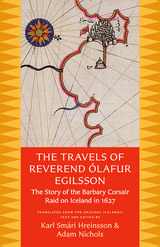
The Travels of Reverend Olafur Egilsson
Karl Smari Hreinsson
Catholic University of America Press, 2016
The combination of Reverend Olafur's narrative, the letters, and the material in the Appendices provides a first-hand, in-depth view of early seventeenth-century Europe and the Maghreb equaled by few other works dealing with the period. We are pleased to offer it to the wider audience that an English edition allows.
[more]
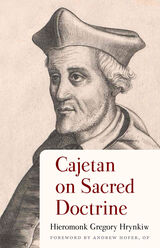
Cajetan on Sacred Doctrine
Hieromonk Gregory Hrynkiw
Catholic University of America Press, 2020
Cardinal Tommaso de Vio (1469-1534), commonly known as Cajetan, remains a misunderstood figure. Cajetan on Sacred Doctrine is the first ever monograph on Cajetan as a theologian in his own right, and it fills an immense lacuna in the debate on the nature of sacred doctrine from the Thomism of the Renaissance. Confirming Cajetan as a key protagonist within the emergent Reformation, this work delivers an indispensable immersion into his theological method in relation to his closest predecessors and contemporaries: Hervaeus Natalis, Blessed Duns Scotus, Gregory of Rimini, Johannes Capreolus, Silvestro Mazzolini da Prierio, Martin Luther, and others.
The first ever commentary on St. Thomas Aquinas’s entire Summa Theologiae was published by Cajetan. This monograph focuses primarily on the Summa Theologiae Ia pars, question 1, concerning sacred doctrine, and how Cajetan unpacks the potency of Aquinas’s opening syllogism, setting forth a coherent division of the question, and ultimately touching the mind of Aquinas when revealing the articles of the Apostles’ Creed as the Summa Theologiae’s macrostructure. Finally, we are shown how Cajetan emphasizes the essential link between ecclesiology and the communication of sacred doctrine, especially the papacy’s role in guaranteeing the proposal and explication of the faith.
Cajetan’s accomplishments as a biblical exegete established him as a renowned Renaissance scholar and a forerunner of future ecumenical dialogue. Furthermore, his grasp of theology’s perennial properties continue to make him an important interlocutor in the renewed quest for a unity in theology in an ever more fragmented aggregation of theologies.
Cajetan’s theological labor is a perpetuation of the via antiqua, a biblical-theological worldview handed down through Tradition. St. Gregory the Theologian (329-390), the via antiqua’s preeminent Eastern representative and chief theological constructor of Christendom, offers the monograph’s author--himself a Byzantine Hieromonk--a prime opportunity for a few closing insights on the innate symphony between two very distant periods and distinct theological traditions within the one ecumenical Church.
[more]
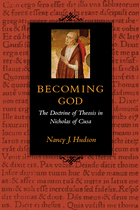
Becoming God
The Doctrine of Theosis in Nicholas of Cusa
Nancy J. Hudson
Catholic University of America Press, 2007
The doctrine of theosis means a salvation that is the deification of the saved. The saved actually become God. This unusual doctrine lies at the heart of Nicholas of Cusa's (1401-1464) mystical metaphysics. It is here examined for the first time as a theme in its own right, along with its implications for Cusanus's doctrine of God, his theological anthropology, and his epistemology.
[more]
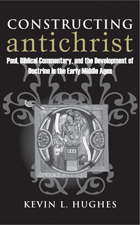
Constructing Antichrist
Paul, Biblical Commentary, and the Development of Doctrine in the Early Middle Ages
Kevin L. Hughes
Catholic University of America Press, 2005
Constructing Antichrist engages readers with the question: what does Paul have to do with the Antichrist? Integrating new scholarship in apocalypticism and the history of exegesis, this book is the first longitudinal study of the role of Paul in apocalyptic thought
[more]
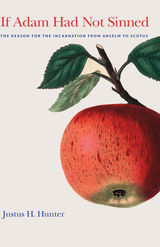
If Adam Had Not Sinned
The Reason for the Incarnation from Anselm to Scotus
Justus H. Hunter
Catholic University of America Press, 2020
Since the twelfth century, theologians have found a counterfactual question irresistible: “If Adam had not sinned, would the Son have become incarnate?” In the latter half of the twentieth century, Hans Urs von Balthasar, Hans Küng, Gerhard Ludwig Müller, Karl Rahner, Karl Barth, Wolfhart Pannenburg, Jürgen Moltmann, and Robert Jenson all considered this question on the reason, or motive, for the incarnation. Nearly every case refers to the classic disagreement between those who follow Thomas Aquinas and those who follow John Duns Scotus.
Though it is common to claim Thomas or Scotus as one’s authority, the theological debates among which Thomas and Scotus developed their own positions remain largely neglected. This study fills that gap. If Adam Had Not Sinned is a study of the medieval debates over the motive for the incarnation from Anselm of Canterbury to John Duns Scotus. While the volume is primarily focused on thirteenth-century debates at the University of Paris, it also supplies necessary historical background to those debates. As a result, the larger context within which Thomas Aquinas and John Duns Scotus developed their influential responses is detailed. This larger context permits an analysis that leads to the surprising claim, against widespread assumptions, that the responses given by Thomas and Scotus are substantially reconcilable.
[more]

John Henry Newman on Truth and its Counterfeits
A Guide for Our Times
Reinhard Hutter
Catholic University of America Press, 2020
Reinhard Hütter’s main thesis in this third volume of the Sacra Doctrina series is that John Henry Newman, in his own context of the nineteenth century, a century far from being a foreign one to our own, faced the same challenges as we do today; the problems then and now differ in degree, not in kind. Hence, Newman's engagement with these problems offers us a prescient and indeed prophetic diagnosis of what these problems or errors, if not corrected, will lead to—consequences which have more or less come to pass—and, furthermore, an alternative way which is at once thoroughly Catholic and holds contemporary relevance.
The introduction offers a survey of Newman’s life and works and each of the subsequent four chapters addresses one significant aspect of Christianity that is not only contested or rejected by secular unbelief, but also has a counterfeit for which not only Christians, but even Catholics have fallen. The counterfeit of conscience is the “conscience” of the sovereign subject (Ch. 1); the counterfeit of faith is the “faith” of one who does not submit to the living authority through which God communicates but rather adheres to the principle of private judgment in matters of revealed religion(Ch.2); the counterfeit of doctrinal development is twofold: (i) paying lip service to development while only selectively accepting its consequences on the grounds of a specious antiquarianism and (ii) invoking development theory to justify all sorts of contemporary changes according to the present Zeitgeist (Ch. 3). Finally, the counterfeit of the university are all those “universities” whose end is not to educate and thereby to perfect the intellect, but rather to feed more efficiently the empire of desire that is informed by the techno-consumerism of today (Ch. 4). The book concludes with an epilogue on Hütter’s journey to Catholicism.
[more]
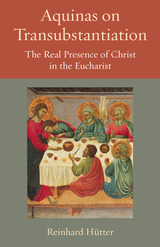
Aquinas on Transubstantiation
Reinhard Hutter
Catholic University of America Press, 2019
Aquinas on Transubstantiation treats one of the most frequently mis-understood and mis-represented teachings of Thomas Aquinas—Eucharistic transubstantiation. The study interprets Aquinas’s teaching as an exercise of “holy teaching” (sacra doctrina) that intends to show theologically and back up philosophically the simple yet profound thesis that “transubstantiation” affirms nothing but the truth of Christ’s words at the Last Supper—“This is my body,” “This is my blood.” Yet in order to achieve a contemporary ressourcement of this simple yet profound truth, it is necessary to probe the depths of Thomas Aquinas’s philosophical interpretation of it. For Thomas Aquinas, in regarding the truth of Eucharistic conversion, it is faith that preserves the human intellect from missing or dismissing the mystery announced in Christ’s words. Faith, however, is not intellectually blind, a faith that, as is often erroneously held, is commanded by arbitrary divine dictates to which the will submits in blind obedience. Rather, Aquinas takes faith is sustained, but not constituted, by an intellectual contemplation of the proposed mystery of faith, by faith seeking understanding. Thomas Aquinas unfolds this exercise of understanding guided by faith in the medium of a metaphysical contemplation that affords a profound intellectual appreciation of this central mystery of faith—precisely as mystery. Thomas’s metaphysical contemplation of Eucharistic conversion gestures toward the blinding light of superintelligibility, experienced as the unique darkness that surrounds this sublime mystery of faith. A ressourcement in Thomas Aquinas’s doctrine of transubstantiation also affords an renewed appreciation of the Church’s affirmation of transubstantiation as the most apt term for the interpretation of the mystery of Eucharistic conversion and a greater precision of what is centrally at stake in this mystery in the ongoing ecumenical conversation of this most central Christian teaching. A doctrinally sound, ecumenically informed, and philosophically reflected contemporary Catholic theology cannot afford to ignore or dismiss Aquinas’s surpassing account of Eucharistic conversion.
[more]
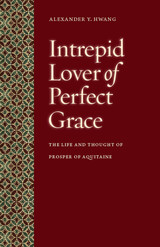
Intrepid Lover of Perfect Grace
The Life and Thought of Prosper of Aquitaine
Alexander Y. Hwang
Catholic University of America Press, 2009
Intrepid Lover of Perfect Grace provides students and scholars with the first biography of Prosper of Aquitaine (388-455) and the first book-length study in English of this important figure in the history of Christianity
[more]
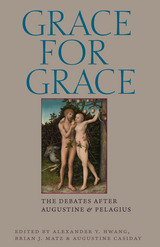
Grace for Grace
Alexander Y. Hwang
Catholic University of America Press, 2014
The contributors to Grace for Grace focus on the debates on grace and free will inspired by Augustine's later teachings on grace and the various reactions to it. In both popular and scholarly literature, the conflict has been traditionally referred to as the "Semi-Pelagian Controversy." For several decades, scholars have distanced themselves from that overly-simplistic and inaccurate portrayal. This book intends to solidify a disparate movement of scholarly thought and offer a secure basis for renewed study of the persons, texts, and events of this critical period in the reception of Augustine in the Early Middle Ages. This volume brings together new perspectives, based on fresh study of a wealth of primary sources, from an international team of scholars to explore the intra-church debates over grace and free will, after Augustine and Pelagius.
[more]
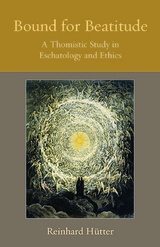
Bound for Beatitude A Thomistic Study in Eschatology and Ethics
Reinhard Hütter
Catholic University of America Press, 2019
Bound for Beatitude is about St. Thomas Aquinas’s theology of beatitude and the journey thereto. Consequently, the work’s topic is the meaning and purpose of human life embedded in that of the whole cosmos. This study is not an antiquarian exercise in the thought of some sundry medieval thinker, but an exercise of ressourcement in the philosophical and theological wisdom of one of the most profound theologians of the Catholic Church, one whom the Church has canonized, granted the title “Doctor of the Church,” and for a long time regarded as the common doctor. This exercise of ressourcement takes its methodological cues from the common doctor; hence, it is an integrated exercise of philosophical, dogmatic, and moral theology. Its specific theological topic, the ultimate human end, perfect happiness, beatitude, and the journey thereto—stands at the very heart of St. Thomas’s theology. Far from being passé, his theology of beatitude is of urgent pertinence as the crisis of humanity and of creation and the exile of God seems to approach its apogee.
By way of a presentation, interpretation, and defense of Thomas Aquinas’s doctrine of beatitude and the journey thereto, Bound for Beatitude advances an argument based on four theses: (1) The loss of a theology of beatitude has greatly impoverished contemporary theology. In order to succeed and flourish, theology must recover a sound teleological orientation. (2) In order to recover a sound teleological orientation, theology must recover metaphysics as its privileged instrument. (3) Thomas Aquinas provides a still pertinent model for how theology might achieve these goals in a metaphysically profound theology of beatitude and the beatific vision. Finally, (4) Aquinas’s rich and sophisticated account of the virtues charts the journey to beatitude in a way that still has analytic force and striking relevance in the early twenty-first century.
[more]
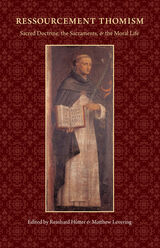
Ressourcement Thomism
Sacred Doctrine, the Sacraments, and the Moral Life
Reinhard Hütter
Catholic University of America Press, 2010
The essays in this volume explore three areas in which St. Thomas Aquinas's voice has never fallen silent: sacred doctrine, the relationship of sacraments and metaphysics, and the central role of virtue in moral theology.
[more]
READERS
Browse our collection.
PUBLISHERS
See BiblioVault's publisher services.
STUDENT SERVICES
Files for college accessibility offices.
UChicago Accessibility Resources
home | accessibility | search | about | contact us
BiblioVault ® 2001 - 2024
The University of Chicago Press



